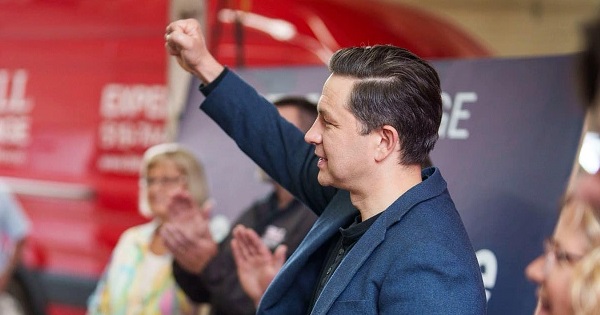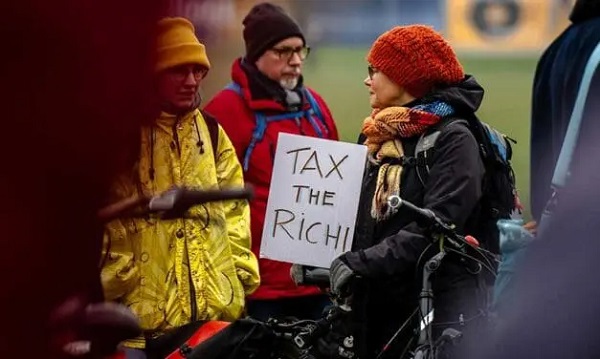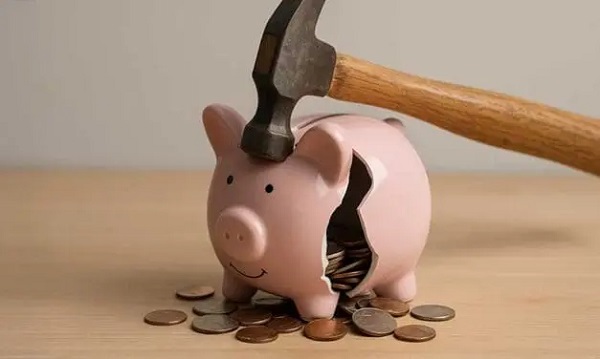Dan McTeague
“Axe the Tax” is just the beginning

From Canadians for Affordable Energy

All across Canada preemptive obituaries are being written for the Carbon Tax. (I’ve written one myself.) And for good reason. The closer we get to the full implementation of Justin Trudeau’s carbon tax, the harder regular people are being hit in the wallet. The tax has helped make it more expensive to feed and clothe our families, to heat our homes, and to gas up our cars. It has been a direct assault on the Canadian standard of living.
The fact that the Trudeau Liberals are behind the Carbon Tax is central to their collapsing poll numbers. And Conservative leader Pierre Poilievre has capitalized on its unpopularity by pledging to “Axe the Tax” every chance he gets. Chances are that pledge will carry his party into the majority, whenever we get around to having an election.
That said, we must be careful because the Carbon Tax is just one part of Trudeau’s Net-Zero program. It would be a catastrophic blunder for the Conservatives, upon entering government, to repeal only the Carbon Tax and leave the rest of the Liberals’ green agenda in place. Doing so would jeopardize Poilievre’s ability to make life in Canada more affordable.
There are a whole raft of policies on this file which a Poilievre government should quickly repeal. Here are a few which ought to be at the top of the list:
Clean Fuel Regulations (CFR)
Trudeau’s Clean Fuel Regulations (CFR), which I’ve nicknamed the Second Carbon Tax, are designed to reduce the carbon intensity of fuels like gasoline and diesel by blending increased amounts of ethanol into those fuels, making them less efficient while potentially contributing to engine corrosion and other problems. Plus, it’s estimated that the CFR will raise gasoline prices between six and seventeen cents a litre by 2030. Which is to say, we’ll be paying more for fuel and getting less out of it.
And, like the original Carbon Tax, the cost of the CFR is felt beyond the pumps, with estimates suggesting it will increase household energy costs by between 2.2 and 6.5 percent a year, while also significantly constricting the growth of our economy. These regulations ought to be scrapped entirely.
Emissions Caps
As I’ve written elsewhere, the Trudeau government’s proposed Emissions Cap, which targets our nation’s oil and gas sector, “would make Canada the only country in the world which willingly and purposefully stifles its single largest revenue stream.” Oil and gas is our “golden goose,” according to a study by Jack Mintz and Philip Cross, but the Trudeau government is proposing a cap on that sector’s carbon emissions, which a recent Deloitte report found “would lead to a 10% decrease in Alberta’s oil production and a 16% decrease in conventional natural gas production.” That translates to an estimated decline of real GDP in Alberta of $191 billion, and of $91 billion in the rest of Canada.
This is madness, and that’s before we even touch on the fact that it will have no discernable impact on global carbon emissions. It merely ensures that the world’s energy needs will be met by less environmentally responsible nations like Russia, Venezuela, Saudi Arabia, and Iran.
Electric Vehicle Mandates and Subsidies
Among the most reckless policies enacted by this government is Trudeau’s Electric Vehicle (EV) mandate, which bans the sale of new gas-and-diesel driven cars and trucks by 2035. I’ll say that again – in just under a decade, every new car and truck sold in Canada will have to be electric! This despite the fact that electric vehicles are notoriously bad at holding their charge in cold weather, one of our country’s trademarks.
And that’s assuming you can find a place to charge them. Natural Resources Canada estimates that we will need roughly 450,000 public charging stations by 2035 to make this EV transition at all realistic. At the moment we have about 28,000.
Plus, the wholesale adoption of EVs across Canada would put a tremendous strain on our electrical grid, especially at a time when the environmentalists have been pushing for a nationwide transition to less reliable methods of generating electricity, like wind and solar.
And then there’s the billions in subsidies which support the mandate. Federal and provincial taxpayer dollars are being thrown at automotive companies to underwrite their producing a product which taxpayers will then be forced to buy. It’s an outrageous example of double dipping.
Poilievre seems to understand this. He has called the EV mandate “a tax on the poor,” because of the elevated cost of an EV, compared to traditional vehicles, and he’s slammed the subsidies as bad deals for Canada.
Even so, when Trudeau has accused Poilievre of wanting to cancel the subsidies, Poilievre has tended to pivot to discussing the “generational” opportunity Canada has to start producing the minerals necessary for EV batteries, if only the Liberals would speed up the approval process for new mines.
That’s all well and good, except that the entire EV industry is built on subsidies and mandates. And even with those, countries around the world are finding that demand for EVs is much softer than anticipated. Some “generational” opportunity for Canada, to become a key link in the supply chain for a product that no one wants! Much better to change course, scrap the mandates and subsidies, and see if the industry can stand on its own two feet. Once consumers have shown that they’re willing to buy EVs, then we can talk.
And Many More…
Of course, repealing these policies is just scratching the surface. I could easily have written about the problems with Bill C-69, the so-called “no new pipelines bill;” Bill C-48, the Oil Tanker Moratorium Act which significantly reduces Canada’s ability to export our natural resources; or Bill C-59, which bans businesses from touting the environmental positives of their work if it doesn’t meet a government-approved standard.
The fact of the matter is, Canadians need a government that will not just pull down the low-hanging fruit of the Carbon Tax, but to “axe” the numerous Net-Zero policies, enacted by Trudeau’s and his environmentalist allies over the past nine years, which are making all of our lives more expensive.
Pierre Poilievre has his work cut out for him. Let’s all hope that he turns out to be the man we need him to be. We can’t afford anything less.
Dan McTeague is President of Canadians for Affordable Energy.
Business
Liberal’s green spending putting Canada on a road to ruin

Once upon a time, Canadians were known for our prudence and good sense to such an extent that even our Liberal Party wore the mantle of fiscal responsibility.
Whatever else you might want to say about the party in the era of Jean Chrétien and Paul Martin, it recognized the country’s dire financial situation — back when The Wall Street Journal was referring to Canada as “an honorary member of the Third World” — as a national crisis.
And we (remember, I proudly served as Member of Parliament in that party for 18 years) made many hard decisions with an eye towards cutting spending, paying down the debt, and getting the country back on its feet.
Thankfully we succeeded.
Unfortunately, since then the party has been hijacked by a group of reckless leftwing fanatics — Justin Trudeau and his lackeys — who have spent the past several years feeding what we built into the woodchipper.
Mark Carney’s finally released budget is the perfect illustration of that.
The budget is a 400 page monument to deficit delusion that raises spending to $644.4 billion over five years — including $141.4 billion in new spending — while revenues limp to $583.3 billion, yielding a record (non-pandemic) $78.3 billion shortfall, an increase of 116% from last year.
This isn’t policy; it’s plunder. Interest payments alone devour $55.6 billion this year, projected to hit $76.1 billion by 2029-30 — more than the entire defence budget and rising faster than healthcare transfers.
We can’t discount the possibility that this will lead to a downgrade of our credit rating, which will significantly increase the cost of borrowing and of doing business more generally.
Numbers this big start to feel very abstract. But think of it this way: that is your money they’re spending. Ottawa’s wealth is made up entirely of our tax dollars. We’ve entrusted that money to them with the understanding that they will use it responsibly. In the decade these Liberals have been in power, they have betrayed that trust.
They’ve pursued policies which have made life in Canada increasingly unaffordable. For example, at the time of writing it takes 141 Canadian pennies (up from 139 a few days ago) to buy one U.S. dollar, in which all of our commodities are priced. Well, that’s .25 cents per litre of gasoline. Imagine what that’s going to do to the price of heating, of groceries, of the various other commodities which we consume.
And this budget demonstrates that the Carney era will be more of the same.
Of course, the Elbows Up crowd are saying the opposite — that this shows how fiscally responsible Mark Carney is, unlike his predecessor. (Never mind that they also publicly supported everything that Trudeau did when he was in government.) They claim that Carney shows that he’s more open to oil and gas than Trudeau was.
Don’t believe it.
The oil and gas sector does get a half-hearted nod in the budget with, for instance, a conditional pathway to repeal the emissions cap. But those conditions are important. Repeal is tied to the effectiveness of Carney’s beloved industrial carbon tax. If that newly super-charged carbon tax, which continues to make our lives more expensive, leads to government-set emissions reductions benchmarks being met, then Ottawa might — might — scrap the emissions.
Meanwhile, the budget doubles down on the Trudeau government’s methane emissions regulations. It merely loosens the provisions of the outrageous Bill C-59, an act which should have been scrapped in its entirety. And it leaves in place the Trudeaupian “green” super structure, which has resource sector investment, and any business that can manage it, fleeing to the U.S.
In these perilous times, with Canada teetering on the brink of recession, a responsible government would be cutting spending and getting out of the way of our most productive sectors, especially oil and gas — the backbone of our economy.
It would be repealing the BC tanker ban and Bill C-69, the “no more pipelines act,” so that our natural resources could better generate revenue on the international market and bring down energy rates at home.
It would quit wasting millions on Electric Vehicle charging stations; mandating that all Canadians buy EVs, even with their elevated cost; and pressuring automakers to manufacture Electric Vehicles, regardless of demand, and even as they keep closing up shop and heading south.
But in this budget the Liberals are going the opposite direction. Spend more. Tax more. Leave the basic Net-Zero framework in place. Rearrange the deck chairs on the Titanic.
They’re gambling tomorrow’s prosperity on yesterday’s green dogma, And every grocery run, every gas fill-up, every mortgage payment will serve as a daily reminder that we are the ones footing the bill.
Once upon a time, the Liberals knew better. We made the hard decisions and got the country back on its feet. Nowadays, not so much.
Business
Carney doubles down on NET ZERO

If you only listened to the mainstream media, you would think Justin Trudeau’s carbon tax is long gone. But the Liberal government’s latest budget actually doubled down on the industrial carbon tax.
While the consumer carbon tax may be paused, the industrial carbon tax punishes industry for “emitting” pollution. It’s only a matter of time before companies either pass the cost of the carbon tax to consumers or move to a country without a carbon tax.
Dan McTeague explains how Prime Minister Carney is doubling down on net zero scams.
-

 Business2 days ago
Business2 days agoCanada’s climate agenda hit business hard but barely cut emissions
-

 Business1 day ago
Business1 day agoCarney’s Toronto cabinet meetings cost $530,000
-

 Bruce Dowbiggin1 day ago
Bruce Dowbiggin1 day agoIntegration Or Indignation: Whose Strategy Worked Best Against Trump?
-

 Artificial Intelligence2 days ago
Artificial Intelligence2 days agoAI is accelerating the porn crisis as kids create, consume explicit deepfake images of classmates
-

 Censorship Industrial Complex2 days ago
Censorship Industrial Complex2 days agoConservative MP Leslyn Lewis slams Liberal plan targeting religious exemption in hate speech bil
-

 Health2 days ago
Health2 days ago23,000+ Canadians died waiting for health care in one year as Liberals pushed euthanasia
-

 MAiD1 day ago
MAiD1 day ago101-year-old woman chooses assisted suicide — press treats her death as a social good
-

 espionage1 day ago
espionage1 day agoDigital messages reportedly allege Chinese police targeted dissident who died suspiciously near Vancouver











